 Petzlover
Petzlover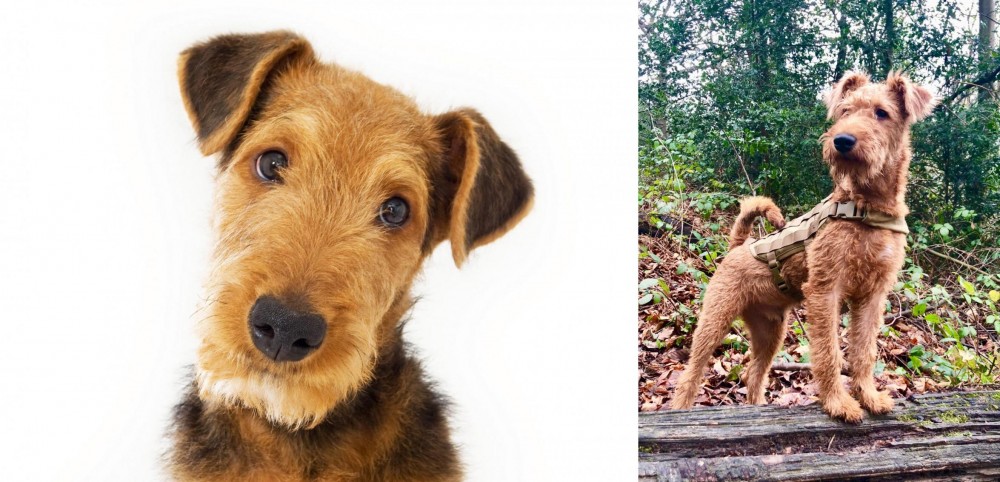 Airedale Terrier is originated from United Kingdom but Irish Terrier is originated from Ireland. Airedale Terrier may grow 11 cm / 5 inches higher than Irish Terrier. Airedale Terrier may weigh 17 kg / 38 pounds more than Irish Terrier. Airedale Terrier may live 3 years less than Irish Terrier. Airedale Terrier may have more litter size than Irish Terrier. Airedale Terrier requires High Maintenance. But Irish Terrier requires Moderate Maintenance
Airedale Terrier is originated from United Kingdom but Irish Terrier is originated from Ireland. Airedale Terrier may grow 11 cm / 5 inches higher than Irish Terrier. Airedale Terrier may weigh 17 kg / 38 pounds more than Irish Terrier. Airedale Terrier may live 3 years less than Irish Terrier. Airedale Terrier may have more litter size than Irish Terrier. Airedale Terrier requires High Maintenance. But Irish Terrier requires Moderate Maintenance
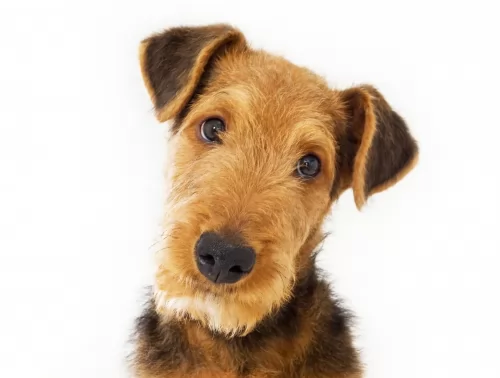 Airedale terrier got its name from a small river Aire in Leeds area in Great Britain. First information about Airedale terrier originates back in 1850. This breed was used as otter hunters. Airedale terrier was invented by mixing Otterhound, old English terrier, and a white bull-terrier. Airedale was used primarily for hunting otters, deer, or wild boars. Not just that, Airedale was a very good guard dog. During the war, this breed was used for delivery and it showed a lot of courage. One Airedale terrier even received a medal for its bravery in World War I. Today it is used as an official dog of National Police of Britain.
Airedale terrier got its name from a small river Aire in Leeds area in Great Britain. First information about Airedale terrier originates back in 1850. This breed was used as otter hunters. Airedale terrier was invented by mixing Otterhound, old English terrier, and a white bull-terrier. Airedale was used primarily for hunting otters, deer, or wild boars. Not just that, Airedale was a very good guard dog. During the war, this breed was used for delivery and it showed a lot of courage. One Airedale terrier even received a medal for its bravery in World War I. Today it is used as an official dog of National Police of Britain.
 The Irish Terrier is a dog breed from Ireland and one of the many different terrier breeds there are.
The Irish Terrier is a dog breed from Ireland and one of the many different terrier breeds there are.
Nobody is too sure of the Irish Terrier's history but it is one of the oldest terrier breeds. It appears as if the dog breed was developed from a wheat colored terrier and the extinct black and tan terrier.
It was always a common practice to crop the ears of terriers, but in 1889 the Irish Terrier Club required that the ears remain uncropped. The first Irish Terrier was shown in 1881, and the first Irish Terrier registered with the American Kennel Club was in 1885. The Irish Terrier Club of America was founded in 1896.
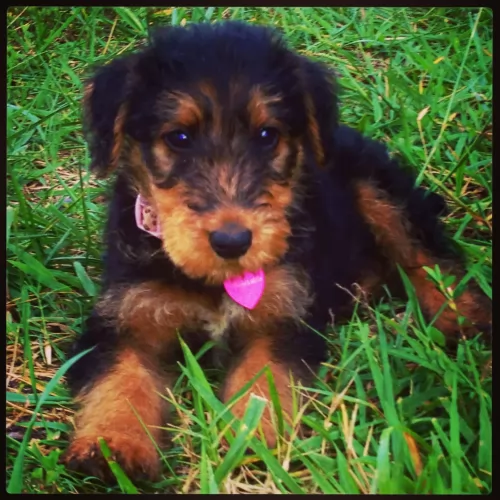 Average height of Airedale terrier is approximately 56-61cm, while their average weight is 20-29kg. Females are slightly smaller than male dogs.
A lifespan of an Airedale terrier variates and depends on the health of the dog but the average lifespan of this breed is 10-12.
Litter Size of the Airedale terrier is approximately 8-9 puppies.
Other Names Waterside Terrier, Bingley Terrier, King of Terriers
Average height of Airedale terrier is approximately 56-61cm, while their average weight is 20-29kg. Females are slightly smaller than male dogs.
A lifespan of an Airedale terrier variates and depends on the health of the dog but the average lifespan of this breed is 10-12.
Litter Size of the Airedale terrier is approximately 8-9 puppies.
Other Names Waterside Terrier, Bingley Terrier, King of Terriers
 The Irish Terrier is a medium sized dog who stands between 45cm and 50cm and weighs in the region of 11 to 12kg. He has a short, dense, wiry double coat which is a red, golden, sandy, wheaten color.
The Irish Terrier is a medium sized dog who stands between 45cm and 50cm and weighs in the region of 11 to 12kg. He has a short, dense, wiry double coat which is a red, golden, sandy, wheaten color.
The ears of the dog are semi-erect/semi-floppy and the tail is held high and curved.The chest is deep and muscular and the front and back legs are strong, long and muscular.
The Irish Terrier is a companion dog today, even though he was once a guard- and hunting dog. He is an amicable dog while also being alert and active. He is also independent and strong-willed so he will require training and socialization as then he becomes obedient and relaxed and much easier to live with.
They're social dogs too, loving all the members of their human family, getting on well with children in the home.
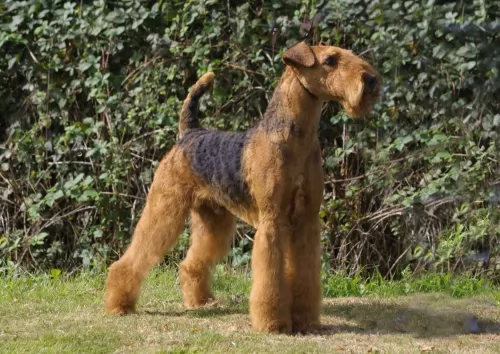 Airedale terrier is an amazing and playful dog. They are very intelligent, hard-working, and athletic dogs. This breed has a lot of energy and stamina, so regular activity is a must for this breed. They are independent thinkers which can be challenging sometimes, but overall, if they have enough activity they are amazing and goofy pets.
Airedale terrier is an amazing and playful dog. They are very intelligent, hard-working, and athletic dogs. This breed has a lot of energy and stamina, so regular activity is a must for this breed. They are independent thinkers which can be challenging sometimes, but overall, if they have enough activity they are amazing and goofy pets.
It is not recommendable to leave your dog for a long period of time because it will get bored, and when it’s bored, they tend to become destructive. You don’t want to see destroyed home when you come back from work.
Airedale terrier is great watchdog too. They will protect family if it is necessary, but overall they are very friendly. They are very sensitive and gentle with kids. Also, with a proper socialization of the dog, they are very friendly towards another animal too.
Basically, the temperament of your Airedale terrier depends on training, socialization, and genes. If you properly train your dog, with good socialization you won’t be having any problems.
 Irish Terriers are good with people and want to be an active member of their human families.
Irish Terriers are good with people and want to be an active member of their human families.
They are active dogs and will require ongoing mental and physical stimulation. This is a lively dog, but he still loves to spend quiet time indoors with his family.
They’re intelligent dogs with a strong sense of loyalty towards their owner, making excellent family pets.
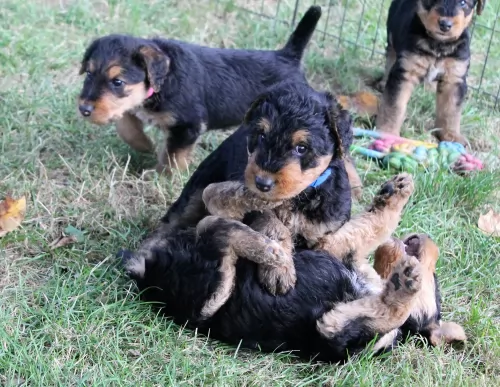 Airedale terrier is generally a very healthy dog, but as almost any breed, they can have some health issues. Hip dysplasia, cancer, and allergies can cause problems with this breed. You have to be very careful when choosing a perfect dog for you. Examine the family tree to avoid the possible genetic flaws.
Airedale terrier is generally a very healthy dog, but as almost any breed, they can have some health issues. Hip dysplasia, cancer, and allergies can cause problems with this breed. You have to be very careful when choosing a perfect dog for you. Examine the family tree to avoid the possible genetic flaws.
Airedale terrier will be a healthy dog if you take a proper care, and with regular vet checks, there shouldn’t be any problems.
 The Irish Terrier is a healthy dog breed and you won't find yourself running to the vet often with him, but still he can land up with one of the common dog problems.
The Irish Terrier is a healthy dog breed and you won't find yourself running to the vet often with him, but still he can land up with one of the common dog problems.
It is always wise to be aware of hip dysplasia as this is a disease which can occur in all dog breeds and all dog ages. Also look out for eye diseases such as progressive retinal atrophy and cataracts as these can lead to blindness in your pet.
There is a disease known as cystinuria which is quite a concern with Irish Terriers. It’s an inherited kidney disease where increased amounts of arginine, lysine, amino acids cystine and ornithine are excreted in the urine.
In well-functioning kidneys, blood is filtered so as to create urine. Cystine is reabsorbed back into the bloodstream but with dogs affected with cystinuria they cannot reabsorb cystine back in their bloodstream, causing an accumulation in the urine. Dogs with cystinuria suffer inflammation of the urinary tract and can also develop urinary blockage and kidney failure. Immediate veterinary intervention is required.
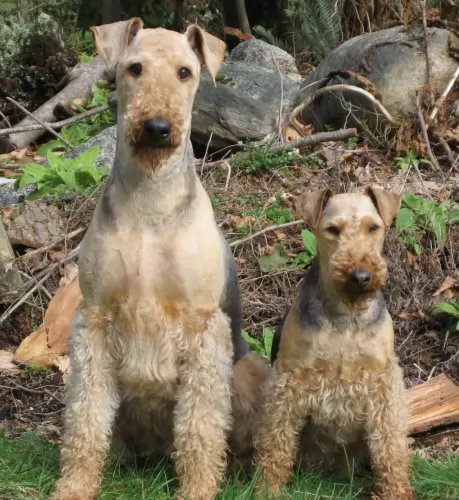 Airedale feeding depends on how much daily activity has. Overall, for an average Airedale 1.5-2.5 cups of high-quality dry food, divided into a 2 meals is recommendable. It is better than leaving the whole food out all the time. Then again, if your dog is not very active or active more than an average dog, feeding should be organized for your dog’s needs.
Airedale feeding depends on how much daily activity has. Overall, for an average Airedale 1.5-2.5 cups of high-quality dry food, divided into a 2 meals is recommendable. It is better than leaving the whole food out all the time. Then again, if your dog is not very active or active more than an average dog, feeding should be organized for your dog’s needs.
Airedale puppies should eat more than an adult dog. 3-5 meals per day are an optimal measure. Puppies need more meals per day for better development. Also, giving your puppy minerals and vitamins would improve overall health when it is fully grown dog.
Airedale has a very interesting coat. The coat has two layers, topcoat which is strong, and undercoat which is soft. They do not shed a lot, but twice a year they shed more than the rest of the time. It is not very hard to groom Airedale terrier. Brushing is recommended once or twice a week. You can also bath your Airedale but not very often. Airedale doesn’t require trimming, but some owners decide to do that. It is up to you if you want to trim your dog.
 The coat of the Irish Terrier requires a brush twice a week to keep it bright. If you intend showing your dog, the coat will need to be stripped a couple of times a year to maintain the texture and color.
The coat of the Irish Terrier requires a brush twice a week to keep it bright. If you intend showing your dog, the coat will need to be stripped a couple of times a year to maintain the texture and color.
Other Irish Terrier owners take their dog to the groomers to have the coat clipped. The dog doesn't shed a lot and they are referred to as being somewhat hypoallergenic.
As with any other dog breed, other grooming needs with your Irish Terrier will include clipping the nails, checking his teeth for plaque build-up and checking inside the ears for infection.
If you're unsure how to perform these grooming procedures with your pet, simply ask your vet who will explain to you precisely how to ensure your dog remains in tip top condition.
He's a fairly active dog so you want to make sure that you are attending to his exercise needs. Take him for a walk every day, and if you've got a good sized garden, throw a ball for him. If you're a jogger you can count him in.
What you feed your Irish Terrier will depend a lot on his age and his activity levels. Every dog is a unique individual and nothing is set in stone regarding their diets. Just like people though, feeding him a lot of junk food will contribute to illness and shorten his lifespan.
He needs quality food. If you buy commercially manufactured food, make sure to read up on how much to feed him. Try and mix in some cooked chicken, brown rice and vegetables from time to time as well as some raw meat.
Learn to know what foods are toxic for him. Make sure he has a bowl of fresh, cool water constantly available to him.